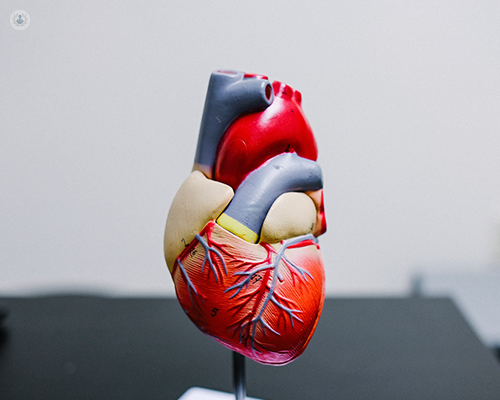What you need to know about cardiovascular disease
Escrito por:
Cardiovascular disease is an umbrella term for a group of conditions that can result in a cardiovascular event such as a heart attack. It is usually linked to a higher risk of blood clots and the build-up of fat in the arteries (atherosclerosis). Cardiovascular disease is one of the biggest causes of death and of disability in the UK, but by living healthily it is often preventable.
In this article below, esteemed consultant cardiologist, Dr Digoarachi S Bulugahapitiya, explains the condition in more detail, including the causes of cardiovascular disease and how it can be avoided.

What are the different types of cardiovascular disease?
There are a number of different types of cardiovascular disease, but the four big ones are as follows:
- Coronary heart disease: Extra strain on the heart is caused when its supply of oxygen-rich blood is cut off or reduced. This can result in heart attacks, heart failure, or angina.
- Strokes and transient ischaemic attacks (TIAs): When blood ceases to flow to the brain, damage or even death can follow. A TIA, or mini-stroke, is when the flow of blood to the brain is only interrupted briefly.
- Peripheral arterial disease: When arteries leading to the limbs become blocked, this can induce leg pains, ulcers on the legs and feet, and weakness or numbness.
- Aortic disease: Aortic diseases are a variety of diseases that affect the aorta, the biggest blood vessel in the body. Aortic aneurysm, one of the most typical aortic diseases, occurs when the aorta weakens and protrudes outwards.
What causes cardiovascular disease?
There are any number of risk factors that can cause cardiovascular disease. Of course, the more risk factors a person might have, the higher the chances of cardiovascular disease.
The biggest causes of cardiovascular disease are:
- smoking
- high cholesterol
- high blood pressure
- diabetes
- obesity
- family history of cardiovascular disease
- physical inactivity
- alcohol
People over the age of 40 are invited by the NHS to undergo a cardiovascular disease check-up every five years.
How can cardiovascular disease be prevented?
Lifestyle is a key factor when it comes to cardiovascular disease prevention. Maintaining a healthy and balanced diet greatly improves the health of the heart.
- Cutting down on salt, sugar, and saturated fat levels, and eating plenty of fresh fruit and vegetables will greatly decrease the risk factors of developing cardiovascular disease.
- 150 minutes of gentle aerobic activity is advised each week. As an individual gets fitter, exercise intensity can be gradually increased.
- Drinking more than 14 alcohol units a week is not recommendable.
- Smokers should aim to quit. Their bodies will thank them.
- It is also advisable to keep a healthy weight and keep a body mass index (BMI) below 25.
- For people with a very high risk of developing cardiovascular disease, medication may be needed.
To schedule an appointment with Dr Digoarachi S Bulugahapitiya, visit his Top Doctors profile today.


